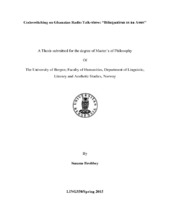| dc.description.abstract | Codeswitching (CS) between Akan and English in recent times has become a tool used on Akan radio, to disseminate information in Ghana. This study explored the functions CS plays during formal interaction on Akan radio talk-show, and listeners’ reaction to it. Data was obtained from political and sports talk-shows, from radio stations with wider coverage within the metropolis, and which has been in existence for ten years or more. Program Managers were interviewed, and questionnaires were distributed to participants for their responses on the use of CS on air. The transcribed interviews, and radio conversations, were examined for themes and compared with other published and archival materials, including responses from the respondents for corroborative purposes. The transcribed conversations was analyzed based on the Markedness Model (Myers-Scotton 1993, 1995) and Conversational Analysis theory (Auer 1995). In the analysis, CS was used: to emphasize disagreement, as a principle of economy, to level inequality, for public preference, for direct quotation, and as identity of bilingual persona. The following type of CS was also observed: intersentential, intrasentential and extra-sentential. The data has also shown that, Akan-English CS on Ghanaian radio talk-show depicts the first ‘negotiation principle’ –the unmarked choice maxim. Essentially, CS is considered an asset by program managers in order to reach out to a larger audience, due to the versatile linguistic milieu. Moreover, the listeners to some extent considered CS acceptable, irrespective of their gender, age, educational level, and mother tongue. In all, 67.50% of the respondents agreed to the use of CS in disseminating information. Also, Akan-English CS, from the intrasentential point of view, does not occur arbitrarily. Data has shown that, intrasentential CS at the world level, especially English verbs, is guided by Akan morphology and phonology. This implies that CS today is an asset rather than a problem. | en_US |
